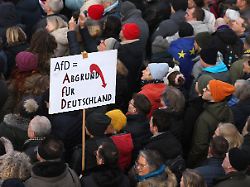Big protest against the right
Merz warns of a “Nazi club” against the AfD
January 22, 2024, 8:17 a.m
Listen to article
This audio version was artificially generated. More info | Send feedback
Hundreds of thousands of people nationwide campaigned against right-wing extremism at the weekend. The big protest impressed politicians. Mecklenburg-Western Pomerania’s Prime Minister Schwesig sees the AfD confronted with unprecedented rejection. CDU boss Merz, on the other hand, warns.
The big protest weekend with hundreds of thousands of participants all over Germany is over, almost at least: many people in some cities also want to take to the streets against right-wing extremism on Monday. Demonstrations have been registered in Bayreuth, Freiberg in Saxony and Paderborn in East Westphalia. The sociologist Klaus Hurrelmann sees the great willingness to participate as evidence of a change in the mood of the population: “The protests against the right seem to me like a liberation move by groups that were preoccupied with themselves for a long time because of Corona and the many other challenges and almost overlooked it “What’s at stake,” he told the “Augsburger Allgemeine”.
In Munich, the protest on Sunday had to be stopped because there were too many people; the police said there were around 100,000 participants. According to police estimates, up to 100,000 people also came together in Berlin. Tens of thousands also took to the streets in cities such as Frankfurt, Hanover, Cologne, Bremen and Leipzig. According to the police, 6,000 people campaigned against the right in smaller cities like Erfurt, 12,000 in Kassel and 16,000 in Halle.
“We must not insult AfD voters as Nazis”
Politicians were impressed by the large number of demonstrators. SPD General Secretary Kevin Kühnert called the actions “an impressive demonstration of a self-confident civil society.” It is important that the momentum of the last few days does not die down, said Kühnert to the “Rheinische Post” from Düsseldorf. “The many rallies must become a much more sustainable commitment to our democracy.”
Saxony’s Prime Minister Michael Kretschmer called the protests “moving.” The federal government must act, demanded the CDU politician in the ARD’s “Report from Berlin”. “We all have a civic responsibility to get involved.” He is convinced that it will be possible to “give this country further decades of stability and prosperity.”
CDU Friedrich Merz was also happy about the nationwide demonstrations, but at the same time warned against dismissing the AfD as a “Nazi party”, like NRW Prime Minister and party colleague Hendrik Wüst (CDU). “Of course there are real National Socialists,” said Merz on the ARD show Caren Miosga that evening. “But that doesn’t mean that the voters of this party are all Nazis. And if we want to win them back for the democratic parties in our country, then we can’t insult them.”
It is more important to solve the problems in the country, then the support for the right-wing party will decrease again. “The Nazi club doesn’t get us anywhere,” said Merz. He renewed his commitment not to cooperate politically with the AfD, but admitted that demarcation at the local level is sometimes difficult – but this applies to all parties.
Schwesig sees AfD under pressure
The protests were triggered by the revelations by the Correctiv research center about a meeting of right-wing extremists on November 25th, in which AfD politicians as well as individual members of the CDU and the very conservative Values Union took part in Potsdam. The former head of the right-wing extremist Identitarian Movement in Austria, Martin Sellner, said he spoke about “remigration” at the meeting. When right-wing extremists use the term, they usually mean that large numbers of people of foreign origin should leave the country – even under duress.
Mecklenburg-Western Pomerania’s Prime Minister Manuela Schwesig explained in the Berlin “Tagesspiegel” that she had the impression that the AfD was coming under pressure as a result of the demonstrations. “We are experiencing something completely new: a mass protest against a party that is partly right-wing extremist. The many demonstrations are encouraging the Democrats.”
A part of the population shares the AfD’s content and slogans and cannot be convinced even if the traffic light government made up of the SPD, Greens and FDP does a better job, said Schwesig. “What is crucial, however, is how strongly the AfD wins over protest voters. It is precisely these voters that we want and can win back,” she said. “Citizen dialogues, investments in infrastructure, conversations at eye level instead of making decisions over people’s heads” are suitable for this.
